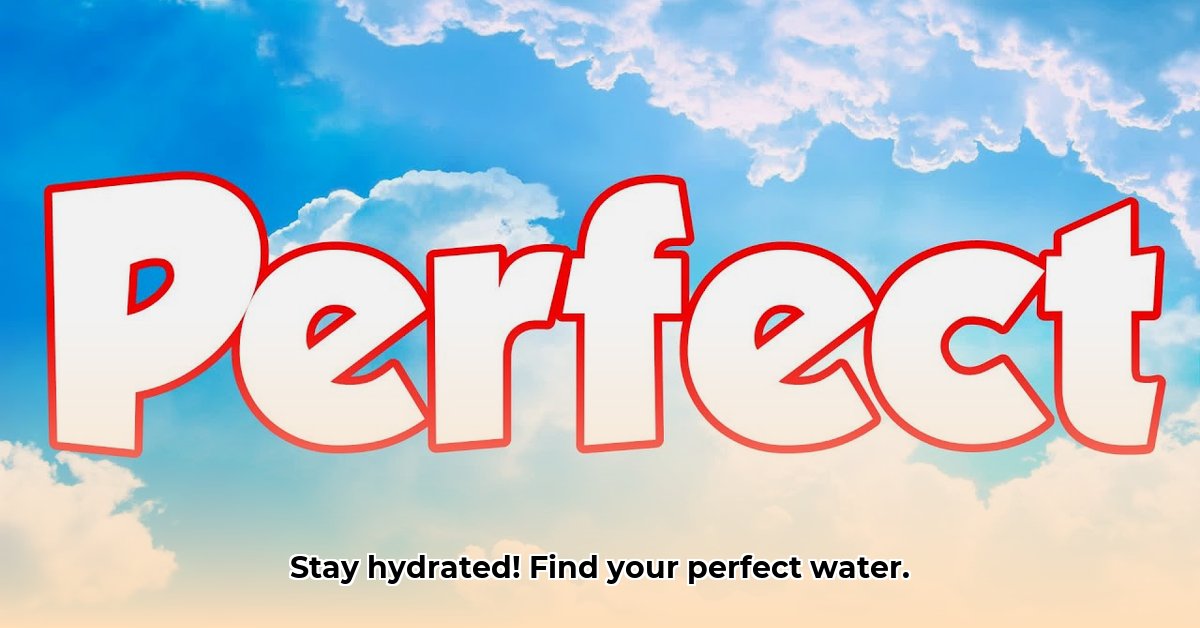
Staying properly hydrated is crucial for your well-being. But with so many water options available – from the tap to premium bottled brands – choosing the best one can feel overwhelming. This guide will help you navigate the choices, focusing on finding the perfect water for your needs, budget, and lifestyle.
Comparing Premium Waters: Perfect Hydration and MCS Water
Two popular choices in the premium water market are Perfect Hydration and MCS Water. Both promise superior hydration, but their approaches differ significantly. Let's break down the key features:
Perfect Hydration markets itself as offering "9x purified alkaline water" with added electrolytes, claiming benefits like improved athletic performance and increased energy. While these sound appealing, robust scientific evidence supporting these specific claims is still limited. Their commitment to "eco-friendly" packaging also requires further investigation to verify its sustainability.
MCS Water, on the other hand, emphasizes family health and promotes improved skin health through their water purification system. They suggest that softened water enhances skin health; however, the scientific backing for this claim remains inconclusive and needs more rigorous study. The effectiveness of their purification methods also needs independent verification and objective performance data.
Here's a side-by-side comparison:
| Feature | Perfect Hydration | MCS Water |
|---|---|---|
| Type | Bottled Alkaline Water | In-home Water Purification System |
| Main Selling Point | Enhanced Performance, Alkaline properties | Family Health, Softened Water |
| Price | Higher initial cost per unit. | Higher initial investment, lower ongoing cost per unit. |
| Environmental Impact | Claims eco-friendly packaging; needs verification | Indirect – energy used to run the system |
| Convenience | Ready-to-drink, easily accessible | Requires installation and filter changes |
| Potential Drawbacks | Plastic waste, potentially higher cost per litre | Upfront investment, ongoing maintenance costs |
Isn't it interesting how different approaches exist within the market for premium water? Which one suits your lifestyle better?
Beyond Premium Brands: Exploring Your Options
The search for "perfect water near me" extends beyond high-end brands. Let's look at some readily available choices:
Municipal Tap Water: Often overlooked, tap water is readily available and generally safe. However, taste and purity vary depending on location. A simple filter jug can drastically improve taste and remove sediments or chlorine. This remains the most budget-friendly option. Do you know what's in your tap water?
Other Bottled Water Brands: Many bottled water options exist, each with its own source, purification methods, and environmental impact. Always read labels carefully! A simple change, like reusable bottles, drastically alters the sustainability of this option.
DIY Water Filtration Systems: Home filtration systems offer a long-term solution, ranging from simple pitchers to whole-house systems. While there's an upfront investment, these systems often prove cost-effective in the long run, considering the ongoing cost of bottled water. What long-term water solution is right for your family?
Key Factors to Consider
Choosing the right water involves several considerations:
Budget: Tap water is the most economical option, while bottled water can be expensive. Home filtration systems require an upfront investment but can save money long term.
Health Concerns: If you have specific health goals or concerns (e.g., athletic performance, skin health), research the potential benefits of different water types. Always consult your doctor.
Environmental Impact: Tap water with reusable bottles significantly reduces your environmental footprint compared to bottled water.
Convenience: Bottled water offers unparalleled convenience. Home filtration systems provide consistent access to filtered water but require initial setup and maintenance.
Prof. Sarah Miller, PhD, Head of the Department of Environmental Science at Stellenbosch University, emphasizes, "Consumers should critically assess marketing claims and consider the overall environmental and economic costs associated with different water sources when making their choice. Sustainable practices are paramount."
Conclusion: Finding Your Perfect Fit
The "perfect" water is subjective, depending on your individual needs and preferences. Don't let marketing hype cloud your judgment. By carefully considering budget, health, environmental impact, and convenience, you can make an informed decision and enjoy optimal hydration, easily and affordably. Do your research and choose wisely!